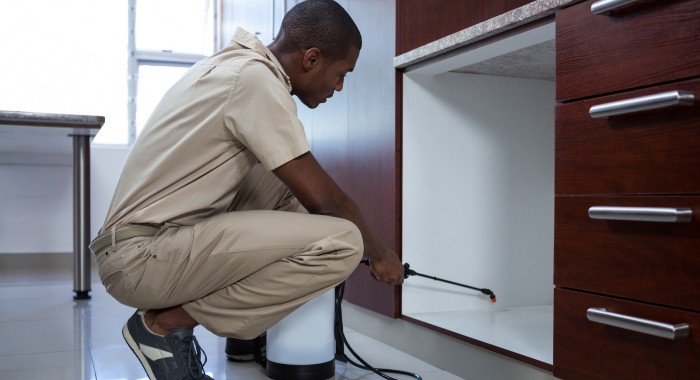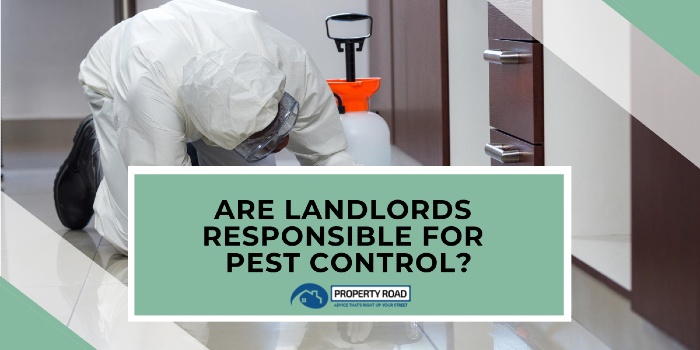When it comes to a rental property, tenants may wonder whether it is their responsibility if there is a pest or vermin infestation – or are landlords responsible for pest control?
Answering who is responsible for pest control in a rental property is more complicated than you might think. A lot depends on when the vermin infestation has begun.
How the pests have come into the property is another factor when trying to establish who is responsible.
Given the potential health risk, this issue is worth looking at in more detail. Every tenant and landlord should be aware of their rights and duties when it comes to a pest infestation in their rental property.
So let’s answer the question: Are landlords responsible for pest control or is it up to the tenants?
What is a pest infestation?

But to start, we need to look at what constitutes a pest infestation because there is no legal definition to refer to. This isn’t ideal, especially if you are a tenant trying to get a landlord to solve the problem.
It’s accepted by most people that unwanted insects or vermin living in your property are a pest, including:
- Mice
- Rats
- Squirrels
- Ants
- Cockroaches
- Bedbugs
- Fleas
- Wasps
Generally speaking, for it to be classed as an infestation, you have to have a large number of insects or animals in your property. If you only see one or two, but there are signs, such as droppings, that show that there are more, then it would also be seen as an infestation.
For example, you may have evidence that there’s just one mouse in the property and the landlord may dispute this as an infestation. Or seeing a handful of ants around your back door doesn’t necessarily mean you have an infestation.
They could have been carried on your shoes after you have been in the garden. Other signs to look out for are smells and sounds. You might not actually see the pests, but if you can hear or smell them, you might want to act.
Even if you don’t experience an infestation, it’s worth for a tenant to try and remove the pest, to prevent it becoming an infestation.
Establishing how the pests have entered the property is also important, because blocking their access will ensure they stay out. Any damage that is found should be repaired by the landlord.
But now let’s get to our question: Are landlords responsible for pest control? The answer is: it depends on the circumstances.
When a landlord is responsible for pest control

If you are renting a furnished property, then in most cases, the landlord will be responsible for pest control. They have a legal obligation to provide a home that is ‘fit for habitation, according to the government’s Housing Health and Safety Rating System (HHSRS).
To comply with the law, a rental property must be:
- Clean
- In good repair
- Be free from pests
If you notice a vermin infestation soon after you have moved in, the chances are it has already been there before you arrived. In this case, the landlord is definitely responsible for pest control.
They have failed to provide you with a home that is ‘fit for habitation’ as set out in the HHSRS.
Determining how the pests entered the property is another way to establish who is responsible to get rid of them. If the access was created due to holes in walls or the roof that should’ve been repaired by the landlord, pest control will be there responsibility.
Again, in this case the landlord has the responsibility to pay for pest control and also the repairs needed to fix the problem that has caused the infestation in the first place.
If the tenancy agreement states that the landlord is responsible for pest control, the case is clear. Even if pest control or pests aren’t actually mentioned, the agreement might state that the landlord will keep the property in a state that is fit for habitation or something similar.
This would also indicate that the landlord is responsible for removing any pests from their rental property.
What should be remembered is that a pest infestation can also be a risk to the tenant’s health. So it’s important to sort the problem as soon as it occurs.
Most landlords will react quickly, as solving the problem is also in their best interest. Pests can cause quite a bit of damage to a property.
However, there are unscrupulous landlords who will avoid having to pay for repairs and pest control. They might even try to evict a complaining tenant rather than solving the problem.
So while in most cases the answer to our question ‘Are landlords responsible for pest control?’ is yes, there are instances when it’s up to the tenant.
When a tenant is responsible for pest control

When moving into a rental property, a tenant will sign a tenancy agreement that will have a clause for them to not cause damage to the home and keep it clean.
However, a pest infestation may occur after a tenant has moved in because:
- They fail to dispose of rubbish properly
- They leave doors and windows open
- Cause damage to the property which leads to an infestation
In any of these scenarios, the tenant will be responsible for pest control, as their actions have caused the problem.
Furthermore, they are in breach of their tenancy agreement as stated above.
How to deal with a pest infestation as a tenant
There are two important factors when it comes to dealing with a pest infestation: prevention and action. But first, as a tenant, you should make sure that there isn’t an infestation already or that there are any damages that could lead to one.
It’s here that the inventory check will prove invaluable, and all tenants should:
- Thoroughly check a rental property when they move in – check for damage inside and outside
- Take photographs and notes
- If there is an issue, tell the letting agent or landlord
This last point is really important because they cannot then accuse you of causing any damage to the property.
And by taking notes and photographs of the rented accommodation, you should be noticing areas that are in need of repair or may be providing access for any pests, particularly mice and rats.
If that access has been created by pests, such as rats chewing through wood or plastic, then the landlord has an obligation to carry out repair work promptly.
Preventing pests from becoming a problem

Assuming the property is in good repair and there is no pest infestation, here are some tips on how a tenant can stop pests from becoming a problem:
- Keep doors and windows closed to keep pests out
- Keep your property and surroundings clean so as not to attract pests
- Don’t leave your bins open or overflowing as this will attract pests
- Ensure any damage that could let pests in is repaired promptly
By following these simple tips, you can ensure that your home remains free from pests of any kind.
However, sometimes pests can still find a way in, especially insects. So you also need to know who to deal with them.
How to deal with pests as a tenant
If you discover a pest in your home, it’s worth establishing if it is an infestation or just one individual. No matter which, you want to get rid of them.
As a tenant, you could lay poison, set traps or prevent access to the property and food sources. This could help prevent a single pest from turning into an infestation.
It’s also important to ensure that you block their way in, because otherwise more will come. Make sure you are:
- Aware of any pests or vermin entering your property
- Understand how and why they may be attracted to your property
- Block off any entry points and remove what attracts them
If it’s already an infestation, report it to your landlord or the letting agent. It’s also a good idea to take video footage or photographs as evidence and include them when you report the infestation.
You will need to notify them in writing about the problem and ask for prompt action. If you are writing a letter, keep a copy safe.
Most landlords will take immediate action, but if you have trouble getting your landlord to do anything you can contact the local council’s Environmental Health Department.
While a local council will be under no obligation to deliver a pest control service to landlords or tenants, regardless of who is at fault, they have powers to order a landlord to solve the issue.
Should the landlord refuse to be responsible for a rental property’s vermin or pest infestation, a tenant can:
- Apply to their local council for enforcement action
- The council can serve an enforcement notice on the landlord
If the landlord refuses to step in, the council may deal with an infestation, and hand the landlord the bill.
In addition to paying the pest control bill from the council, they will have to pay the administration costs the council has incurred as well.
The local council’s Environmental Health department can also help if a landlord isn’t willing to step in, by:
- Carrying out an investigation into the infestation
- Determining who is at fault
- Issueing a request for the relevant work to be carried out
Should there be an issue between the landlord and tenant about who is responsible for the infestation, the council’s environmental health officer will identify how they have entered the property, and what caused the problem.
Once this responsibility has been established, whoever is deemed responsible must respond quickly and take the steps necessary for dealing with a problem.
How to deal with a pest infestation as a landlord

The best way to deal with a pest infestation is to prevent them in the first place. This means landlords have to make sure that their rental properties are clean and in good repair. It’s important to keep this in mind when investing in property.
Making sure that there aren’t any holes in the walls or the roof, will help to keep out many pests. While repairs can be costly, it will be worth the money if it keeps your rental properties free from pests.
A pest infestation isn’t just a nuisance; it can be a risk to your tenant’s health. You are legally obliged to ensure that any rental property you offer is in good repair and fit for habitation.
Aside from all that, it will be difficult to keep and get new tenants if your rental has a problem with pests. And this will cost you even more money in the long run.
So rather than wondering whether landlords are responsible for pest control, ensure that you do all you can to prevent this issue from ever coming up.
That said, this isn’t always possible, so what do you, as a landlord, do if one of your rental properties has a pest problem?
Dealing with a pest infestation as a landlord

If a tenant reports a pest infestation, you first want to establish why it happened. Ideally, you want to work with your tenant to find out how exactly the pests have entered the property.
It’s important to act quickly, because a pest infestation can not only cause harm to the tenant’s health, but also cause damage to the property.
Should your investigations show that the tenant’s behaviour is at the root of the problem, you are within your rights to ask them to pay for pest control. Having a good relationship with your tenant will help you in such situations.
In most cases, however, the responsibility for pest control lies with the landlord. There are two ways of dealing with the problem: contacting the local council or a commercial pest control company.
Most councils have their own pest control service, which you can take advantage of for a charge. This would be the preferred option, as council services are cheaper.
However, if this isn’t an option you will have to call in an independent pest control firm to deal with the problem.
Making any repairs that might have given the pest access to the property is also vital, to prevent the problem from resurfacing.
Conclusion – Are landlords responsible for pest control?
As we have seen, in most cases it’s the landlord’s responsibility to deal with a pest infestation in their rental property. While there are cases where the behaviour of the tenant is to blame, these are rarer.
Landlords have a legal obligation to provide rental properties that are fit for habitation, according to the Housing Health and Safty Rating System (HHSR). This means if necessary repairs aren’t carried out, which then leads to a pest infestation, the landlord is at fault.
At the same time, tenants have to make sure they don’t attract pests by leaving doors or windows open, for example. If they cause any damage that can give pests access to the property, they will have to pay for pest control.
For both landlords and tenants, the best way forward is to prevent a pest infestation from happening in the first place. This means keeping the property in good repair and not attracting pests.




